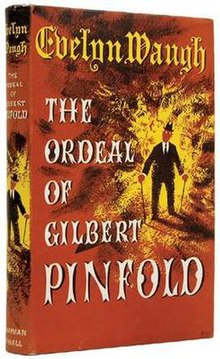 First edition (1957) | |
| Author | Evelyn Waugh |
|---|---|
| Language | English |
| Genre | Novel |
| Publisher | Chapman & Hall |
Publication date | 19 July 1957 |
| Publication place | United Kingdom |
The Ordeal of Gilbert Pinfold is a novel by the British writer Evelyn Waugh, first published in July 1957. It is Waugh's penultimate full-length work of fiction, which the author called his "mad book"—a largely autobiographical account of a period of hallucinations caused by bromide intoxication that he experienced in the early months of 1954, recounted through his protagonist Gilbert Pinfold.
Waugh's health in the winter of 1953–54 was indifferent, and he was beset with various personal anxieties that were stifling his ability to work. He was also consuming alcohol, bromide and chloral in large amounts. In search of a peaceful environment in which he could resume writing, he embarked on a sea voyage to Ceylon, but was driven to the point of madness by imagined voices that assailed him throughout the voyage. These experiences are mirrored in the novel by those of Pinfold, a successful writer in the Waugh mould who, as an antidote to his lassitude and chronic insomnia, is dosing himself with a similar regimen of drugs. This cocktail brings about a series of hallucinatory episodes during a sea voyage taken by Pinfold for the sake of his health; he hears voices that insult, taunt and threaten him. He leaves the ship, but his unseen tormentors follow him. On his return to England, his wife convinces him that the voices were imaginary, and his doctor diagnoses poisoning from the bromide and chloral mixture. Pinfold, however, also views the episode as a private victory over the forces of evil.
On the book's publication, Waugh's friends praised it, but its general critical reception was muted. Most reviewers admired the self-portrait of Waugh with which the novel opens, but expressed divided views about the rest, in particular the ending. Commentators have debated whether the novel provides a real-life depiction of Waugh, or if it represents the exaggerated persona that he cultivated as a means of preserving his privacy. The book has been dramatised for radio and as a stage play.